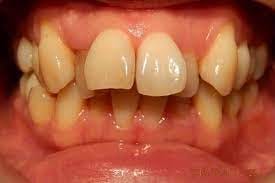What Happens If You Don’t Fix Crowded Teeth?
If you’ve been avoiding the dentist or postponing orthodontic care, you might wonder, what happens if you don’t fix crowded teeth? While crowded teeth may seem like a cosmetic issue, ignoring them can lead to long-term consequences that affect not just your appearance but also your oral health and overall well-being. Left untreated, Crowded Teeth can create problems that are more difficult and costly to correct later on.
Increased Risk of Tooth Decay and Gum Disease:
Crowded teeth often overlap or twist, creating tight spaces that are difficult to clean with regular brushing and flossing. As a result, plaque and food particles tend to build up in these hard-to-reach areas, increasing your risk of cavities and gum disease.
Potential oral health risks include:
Increased plaque accumulation between overlapping teeth
Higher likelihood of tartar formation and gum inflammation
Difficulty removing food debris during daily oral care
Early onset of gingivitis or advanced periodontitis
Over time, these issues can lead to tooth loss, gum recession, and chronic bad breath, which can further impact your confidence and comfort.
Abnormal Tooth Wear and Damage:
When your teeth are not aligned properly, your bite doesn’t distribute pressure evenly across your mouth. This imbalance can lead to excessive wear on some teeth, chipping, cracking, or even jaw strain over time.
Complications from untreated bite problems include:
Premature enamel erosion on specific teeth
Cracked or chipped teeth from uneven force
Tooth sensitivity from exposed dentin
Increased likelihood of needing crowns or fillings
Fixing crowded teeth ensures your bite is balanced, protecting your teeth from unnecessary damage and wear in the long run.
Jaw Pain and TMJ Issues:
A misaligned bite caused by crowded teeth can lead to stress on your jaw joints, especially the temporomandibular joints (TMJ), which connect your jawbone to your skull. This stress can result in discomfort, dysfunction, or chronic jaw pain.
Symptoms of TMJ disorders may include:
Jaw clicking or popping when opening and closing
Headaches or neck pain due to jaw tension
Difficulty chewing or speaking comfortably
Pain in or around the ears
These symptoms can worsen over time if the underlying misalignment is not addressed, potentially leading to the need for more advanced therapy or surgery.
Impaired Speech and Chewing Function:
Teeth play a vital role in your ability to speak clearly and chew efficiently. When they’re out of alignment due to crowding, it can affect how sounds are formed or how well food is broken down during meals.
Common functional issues include:
Speech impediments or lisping caused by poor tooth placement
Difficulty biting into or chewing food thoroughly
Uneven jaw movement that tires the muscles quickly
Digestive problems due to insufficient chewing
By realigning crowded teeth, you not only improve aesthetics but also restore normal oral function.
Low Self-Esteem and Aesthetic Concerns:
While oral health issues are critical, the psychological impact of Crowded Teeth Treatment should not be overlooked. Many people with visible crowding feel self-conscious about their smile, which can affect their confidence in personal, social, or professional settings.
Emotional and aesthetic drawbacks may include:
Embarrassment about smiling or speaking
Avoidance of social interactions or photos
Lower self-confidence in workplace or dating situations
Hesitancy to pursue opportunities due to smile insecurity
Fixing crowded teeth can be a transformative step toward feeling more confident and comfortable in your own skin.
Costlier and Longer Treatments Later:
So, what happens if you don’t fix crowded teeth? The answer is clear: the longer you wait, the more complex—and expensive—treatment can become. Crowded teeth that go untreated tend to worsen over time, leading to additional dental issues and longer recovery timelines.
Delaying treatment may result in:
Needing tooth extractions to create space
Requiring surgical intervention in severe cases
Prolonged orthodontic treatment duration
Increased overall dental expenses in the future
Early intervention not only saves money but also helps prevent complications that could affect your quality of life down the line.



